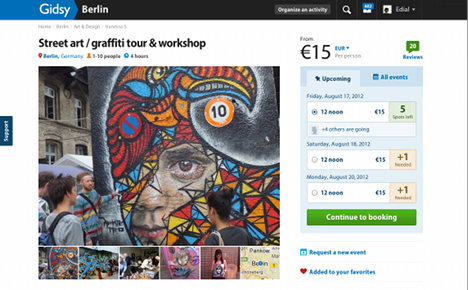Founded by Dutch brothers Edial and Floris Dekker, and Austrian Philipp Wassibauer, in Berlin last year, Gidsy – which comes from the Dutch for to guide – provides users with a platform to host and attend relatively small-scale activities and events in their city.
These range from photography workshops and DIY tutorials to cooking classes and alternative walking tours. Users can post whatever event they like, providing it falls within the Gidsy guidelines – “anything that implies or is explicitly sexual in nature, is not allowed,” community manager Katie Needs told The Local.
Helped along by $1.2 million in seed investment from a handful of powerful investors including Hollywood heartthrob Ashton Kutcher, Gidsy initially only operated in a handful of big cities.
But Thursday’s global launch is set to change this. Co-founder Floris Dekker hopes to “provide people in smaller towns and cities with somewhere to find interesting things to do,” he told The Local.
The idea is “to encourage cultural diversity, give locals the chance to offer their skills and tourists more to do than a tour bus.” The platform is open to everyone, he added, from senior citizens right down to (supervised) children.
“Some people are even making a living from running classes,” said 26-year-old Dekker. There is an ex-policeman based in Amsterdam’s red light district doing very well showing groups around and regaling them with sordid tales from his time on the beat.
Community manager Needs has been helping drive the company’s expansion away from big cities – such as San Francisco and Paris – into more rural areas by launching an ambassador programme, which saw interest from potential Gidsy representatives from more than 60 countries.
“Users can see events as soon as they go online – there’s no waiting around for an updated version of a guidebook,” Dekker said.
Kutcher, who had already invested in successful Berlin start-up SoundCloud, is known to have a soft spot for the city and has been spotted in the area several times but has not attended a Gidsy-run event.
Jessica Ware



 Please whitelist us to continue reading.
Please whitelist us to continue reading.
Member comments